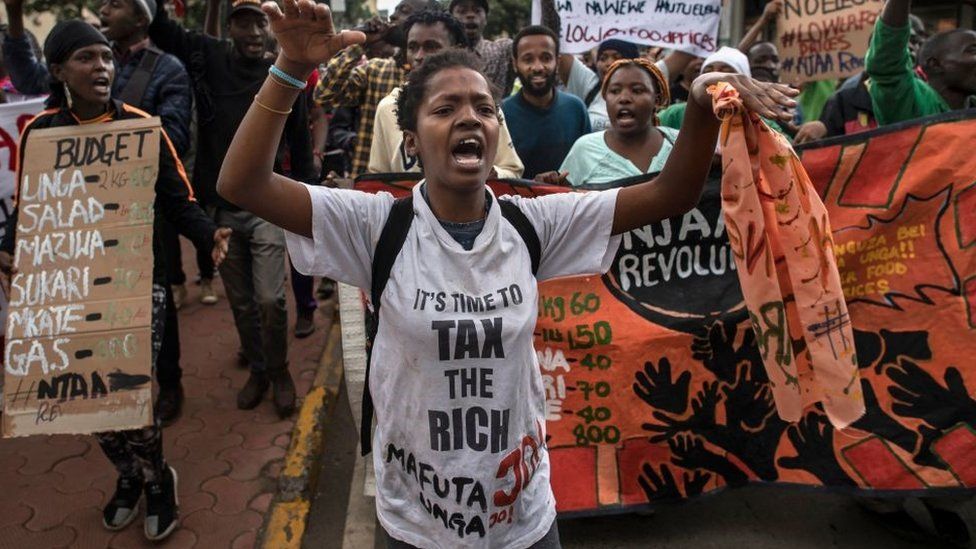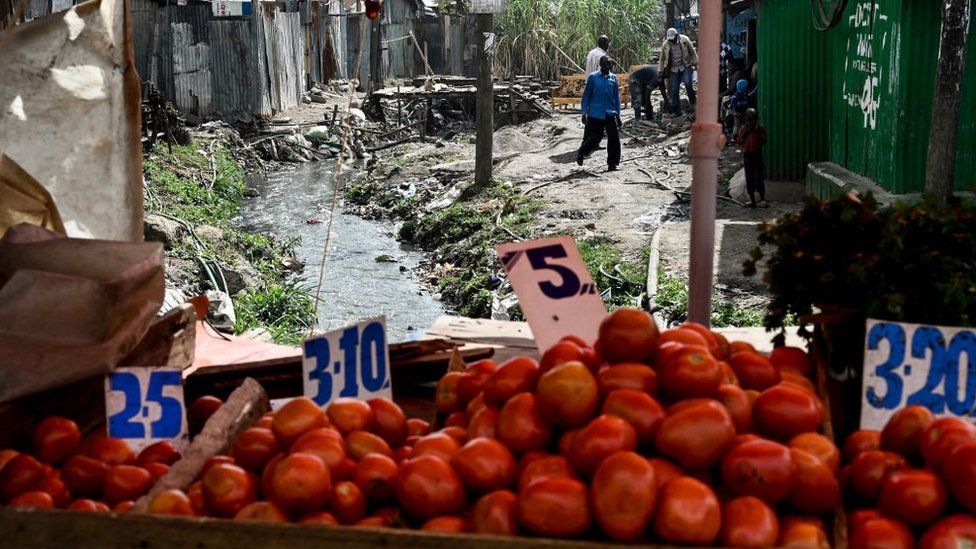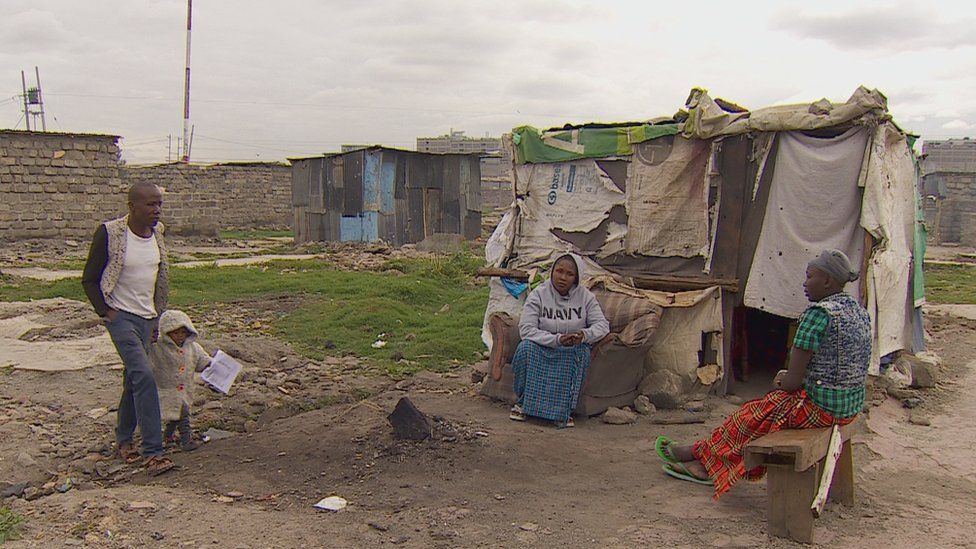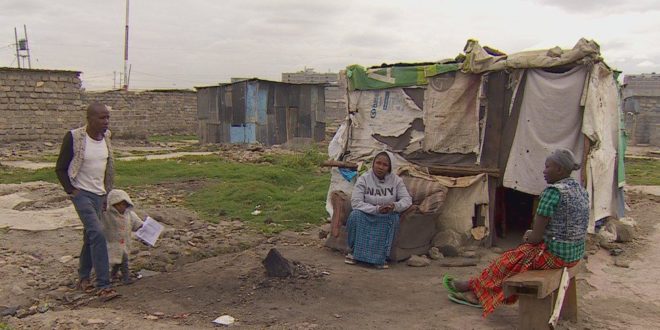Some families in Kenya are eating just once a day, or not at all, because of rising food prices, writes the BBC’s Catherine Byaruhanga in Nairobi.
Early in the morning, I find Florence Kambua hunched over, digging through the dump site outside her front door to collect plastic, glass, clothes – anything she can sell in Kenya’s capital.
The 40-year-old is dressed in a black sweater and knee-high plastic boots. Her job is not for the faint-hearted. It is hazardous too. Rotting food and filled nappies squelch under her feet in the Mukuru Kwa Njenga slum.
“Sometimes you end up with diarrhoea, sometimes you get a chest infection. I have persevered, because I don’t have an alternative,” Ms Kambua tells me.
The mother of six has fallen on hard times. She first moved to Nairobi, East Africa’s biggest metropolis, 19 years ago hoping for a bright future.
In that time, she lost a job, the father of her children left her and the small food stall she set up was demolished for a new expressway that cuts across the city.
So what she is doing now is the only option she has to put food on the table. She makes around 100 Kenyan shillings a day ($0.85; £0.70).
Even with such meagre earnings Ms Kambua says she could still manage to feed her family twice a day before food prices went up.
“My children love rice, I would go with 50 shillings [to the shop] and get half a kilo of rice and cook for them. Now, you cannot.”

Ms Kambua has turned to a well-known staple, maize flour, a cereal that’s often cooked into a thick dough called Ugali that can fill you up but even its price has gone up.
So now she feeds her family once a day, sometimes not at all. “I used to buy the cheapest flour at 85 shillings. Right now, flour is 150 shillings. When I am not able to make money, we sleep hungry.”
A couple of weeks since we met, there is more bad news for Ms Kambua, the average price for two kilogrammes of maize flour is now above 200 shillings, a 25% increase.
The latest data from the Kenya Bureau of Statistics shows annual food inflation is in double digits with prices 12.4% higher in May 2022 than they were in May 2021.
Maize, which is grown in Kenya and also imported from neighbouring countries, is consumed by most households.
It is a cheaper option during lean times, but Kennedy Nyagah, chairman of the United Grain Millers Association, says there is now a shortage.
“I would attribute it to a crop failure because of inadequate rainfall and issues around prices of farm inputs like fertilizers,” he adds.
At Ms Kambua’s local market, business is low. In my two visits there it was not unusual to see customers buy a single onion or tomato because they have become too expensive.
“Previously, a tomato which you see us selling now for 10 shillings, we would sell it for 5 shillings,” vendor Elijah Machuki Nyabutohe tells me, pointing at a basket.
“That is why there are no buyers. They are scared because when they buy a lot of tomatoes, they will not have any money to buy flour and they end up sleeping hungry,” he tells me.
 IMAGE SOURCE,GETTY IMAGES
IMAGE SOURCE,GETTY IMAGESEven though he is far away from Ukraine, he is acutely aware of the impact the war there and how it has driven up the cost of fuel and fertiliser.
“Farmers [are] having to spend more to purchase fertilizers for growing tomatoes. Many end up stopping tomato farming, because of the high cost of the fertilizers and the tomato seeds,” Mr Nyabutohe tells me.
A few hundred metres away from the market lives Catherine Kanini – she is unemployed after the bar she worked in was demolished to make way for the expansion of a road joining onto the expressway.
The 30-year-old mother can’t afford to rent a house, so she’s built herself a makeshift structure out of mosquito nets, sheets of plastic and wooden poles.
She came here from Kitui County in eastern Kenya and like many people on low incomes in urban areas she relies on relatives back home for support when prices are high.
Her mother would send her food from the village, but prolonged drought means that’s not an option.
“Right now, it is very dry back in our rural area. There is no rain. When it rains is when there is food and that is when my mother can send some food,” Ms Kanini tells me. “Now she is expecting us to send her something. She is relying on us, yet we have problems on this end.”

The rising cost of living comes at a time when Kenya is set to hold a general election on 9 August. The issue is featuring prominently on the campaign trail of the two main candidates vying to succeed President Uhuru Kenyatta.
Deputy President William Ruto is talking of a “bottoms-up” approach to improve the economy while long-time opposition leader Raila Odinga has promised cash transfers to poor households.
Ms Kanini has her own advice for them.
“I would suggest that they open factories and they give us work. They should reduce the prices of commodities whose prices they had increased. So that when you are able to make a bit of money you would be able to go and get some food.”
International Crisis Group analyst Meron Elias warns that the cost-of-living crisis could cause instability, especially in a close contest.
“Although the outcome of the election is uncertain – a credit to Kenya’s democracy – we fear that frustration around high food prices and general inflation make it easier for politicians to mobilise frustrated crowds in the streets. It also creates the risk that unemployed youth could be recruited into gangs to commit violence during the electoral period.”
BBC
 Home Of Ghana News Ghana News, Entertainment And More
Home Of Ghana News Ghana News, Entertainment And More





